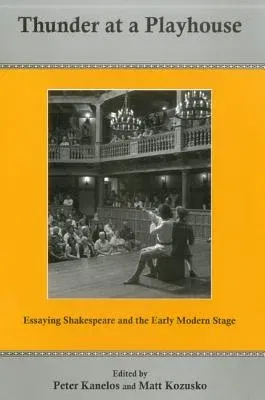What happens when scholarship on the early modern stage is presented on
a recreation of an early modern stage? This question, which at its heart
is the question of the relationship between scholarship and performance,
animates Thunder at a Playhouse: Essaying Shakespeare and the Early
Modern Stage. The essays in this collection all began as papers given at
the Blackfriars Conference, a biennial gathering that stages scholarship
by asking presenters to use the space of the stage, the playhouse, the
audience, and even actors to test out suppositions and hypotheses about
early English theater. Recognizing the slipperiness of putting theory
into practice and of having practice inform theory, the editors, Peter
Kanelos and Matt Kozusko, committed to the root concept of the essay as
attempt, asked the volume's contributors to develop their positions as
fully and as presently possible. The result is a collection of work by
both distinguished and emerging scholars that engages critical issues of
early modern performance in fresh and vital ways. The construction of
early modern playhouses, such as the Blackfriars in Virginia and
Shakespeare's Globe in London, and the increasing interest in exploring
original practices on the early modern stage, have provoked reflection,
deliberation, and debate. What might we understand empirically about
early modern theater, and what is the value of speculative
reconstruction/speculation? How might this sort of knowledge be employed
on the modern stage? And, critically, what are the purposes of such
pursuits for scholars and theater practitioners? Intending to
acknowledge the array of lively approaches to early modern theater and
to encourage conversation and collaboration between scholars, the
editors have compiled a wide-ranging selection of essays. Featuring new
work by David Bevington, Roslyn Knutson, Lars Engle, Peter Hyland, Lois
Potter and others, Thunder at a Playhouse offers insight into such
varied topics as Hamlet's highbrow conception of drama, the portrayal of
barbers, babies, and angels on the early modern stage, the timing of
quick changes in Jonson's The Alchemist, Shakespeare's reading of
Marlowe, and James Burbage's intentions in purchasing the Blackfriars.
Thunder at a Playhouse will be of interest to anyone concerned with
theatrical performance, the history of the stage, or early modern
literary culture. This collection is particularly timely, speaking to an
directly addressing the convergence of theory and practice in the study
of early modern drama

